KWANZAA
Songs For Everyone  Karen Griner Smith
Karen Griner Smith  AuthorHouse 1663 Liberty Drive Bloomington, IN 47403 www.authorhouse.com Phone: 1-800-839-8640 2012 Karen Griner Smith. All rights reserved. No part of this book may be reproduced, stored in a retrieval system, or transmitted by any means without the written permission of the author. First published by AuthorHouse 01/06/2012 ISBN: 978-1-4685-4140-3 (sc) ISBN: 978-1-4685-4139-7 (ebk) Printed in the United States of America Any people depicted in stock imagery provided by Thinkstock are models, and such images are being used for illustrative purposes only. Certain stock imagery Thinkstock. This book is printed on acid-free paper.
AuthorHouse 1663 Liberty Drive Bloomington, IN 47403 www.authorhouse.com Phone: 1-800-839-8640 2012 Karen Griner Smith. All rights reserved. No part of this book may be reproduced, stored in a retrieval system, or transmitted by any means without the written permission of the author. First published by AuthorHouse 01/06/2012 ISBN: 978-1-4685-4140-3 (sc) ISBN: 978-1-4685-4139-7 (ebk) Printed in the United States of America Any people depicted in stock imagery provided by Thinkstock are models, and such images are being used for illustrative purposes only. Certain stock imagery Thinkstock. This book is printed on acid-free paper.
Because of the dynamic nature of the Internet, any web addresses or links contained in this book may have changed since publication and may no longer be valid. The views expressed in this work are solely those of the author and do not necessarily reflect the views of the publisher, and the publisher hereby disclaims any responsibility for them. Contents A Special Celebration
Tune: The Holly and the Ivy Celebrate our Culture
Tune: Angels We Have Heard On High Come and Feel the Love
Tune: Joy To the World Come to the Table
Tune: O Come All Ye Faithful The Days of Kwanzaa Time
Tune: Auld Lang Syne Harumbee! Kwanzaas Here
Tune: Kum Bah Yah Kwanzaa
Tune: Deck the Halls Kwanzaa Is For Family Fun
Tune: We Three Kings of Orient Are Kwanzaa Is the Name
Tune: B-I-N-G-O Kwanzaa Is the Time of Year
Tune: Twinkle Twinkle Little Star Kwanzaa Is Coming
Children, Go Where I Send Thee KWANZAAS HERE
Tune: Jingle Bell Let Us Say Ashe, Ashe
Tune: Bring A Torch Jeanette Isabella Now Is The Time
Tune: Silent Night Our Harvest Celebration
Tune: Oh Christmas Tree Seven Principles of Kwanzaa
Tune: I Saw Three Ships Come Sailing In Signs of Kwanzaa
Tune: Hark The Herald Angels Sing To Celebrate Kwanzaa
Tune: Away In A Manger We All Sing of Kwanzaa
Tune: Here We Come A-Wassailing We Are A Race of Honor
Tune: Go Tell It On The Mountain We Wish You A Happy Kwanzaa
Tune: We Wish You A Merry Christmas To Everette Griner, my father, whose passing during Kwanzaa
inspired these songs; To Rashard, Savannah and Amir Brown, my grandchildren,
who are inspirational by just being themselves; And to Deborah Griner Randall, my sister, who planted the idea of music
for Kwanzaa that school children could sing. Jingle Bells. Silent Night. Oh Come All Ye Faithful.
Joy To the World. I just love Christmas music! I grew up on it. It evokes feelings of happiness, love, and good times. I play it all year round whenever my spirits need a boost. I also love Kwanzaa, the harvest feast period celebrated by many African-Americans. It is a holiday that honors and respects the past, present and future of my people.
I am attracted to Kwanzaas focus on family activities, community spirit, and promotion of togetherness, idea sharing, and creativity. One day it occurred to me that I could have my cake and eat it, too. I combined the music of Christmas and the ideology of Kwanzaa into Kwanzaa Songs!!!!!!!! A small number of the songs are set to universally familiar tunes, which are not traditional Christmas music. These songs belong in this collection because the lyrics evoke the cultural awareness and happy experience that is Kwanzaa. I have three wishes. The first is that all who sing these songs enjoy them as much as I do to add musical spice to Kwanzaa celebrations everywhere.
The second is that these songs help facilitate the spread of the Kwanzaa celebration further into the mainstream of African-American culture. The third is that children in schools will sing these songs during the winter holiday season. We already know the tunes. Now let us embrace the new lyrics with the peace, joy and love of the season. Through these songs may the spirit of Kwanzaa, be enjoyed by the family, sung in schools, and shared with the entire community! Karen Griner Smith Ashe(ah-SHAY)Spiritual thanks Habari gani(HA-bar-ree GA-nee)Whats the news? Whats new today? Harumbee(Ha-RUM-beh)All pull together Imani(ee-MAH-nee)Faith; day seven of Kwanzaa Karamu(ka-RAH-moo)Feast Kikombe Cha Umoja(key-COM-bey CHA oo-MO-jah)Unity cup Kinara(kee-NAH-rah)Candle holder Kujichagulia(koo-gee-cha-goo-LEE-yah)Self determination; day two of Kwanzaa KuumbaKuumba (koo-OOM-bah)Creativity; day five of Kwanzaa Kutoa Majina(koo-TOE-ah mah-GEE-nah)calling the names of family ancestors and great heroes Kwanzaa(KWAN-zah)Harvest celebration Mazeo(ma-ZAY-oh)crops; fruits and vegetables Mishumaa Saba(mee-shoo-MAH SAH-bah)Seven principles Mkeka(em-KEH-kah)Straw mat Muhindi(moo-HIN-dee)Corn Ngoma(n-GO-mah)drums Nguzo Saba(n-GOO-zo SAH-bah)the seven guiding principles on which Kwanzaa is based Nia(NEE-yah))Purpose; day six of Kwanzaa Tambiko(tahm-BEE-ko)pouring libation to honor the ancestors Tamshi la Tutaonana(TAHM-shee LA too-tah-oh-NAH-nah)farewell statement Ujamaa(oo-JAH-mah)Cooperative economics; day four of Kwanzaa Ujima(oo-GEE-mah)Collective works and responsibility; day three of Kwanzaa Umoja(oo-MO-jah)Unity; day one of Kwanzaa Vibunzi(vee-BOON-zee)ears of corn Zawadi(za-WAH-dee)Presents; gifts Tips on Swahili pronounciation. Consonants are pronounced like English consonants.
The R is like the Spanish R and is pronounced by rolling the tongue. In most Swahili words, the accent is placed on the next-to-last syllable. Swahili vowels are pronounced as follows: a (ah), e (ay), I (ee), o (oe), u (oo). When I was a child back in the 50s and 60s my family had gatherings. Adults and children would get together and party! We laughed, danced, sang, ate and talked together. The adults would give the youngsters a nickel or quarter to show them the latest dance steps.
We children would listen to the tales older folks told about how life was in their younger days. Their experiences were foreign to us and we eagerly listened. They described historical conditions in ways that helped us to better understand those times. They spoke of relatives who had passed on whom we never knew before, but whom we came to know through the information that our parents and relatives shared with us. In this way the generations became linked. This was how I learned many important facts, like my mothers relatives were descendants of Robert E.
Lees slaves. We did not have many material things in those days, but we didnt need them. We had love, respect and each other. In celebrating Kwanzaa, I found the spirit and love of those good old days. The word Kwanzaa comes from the Swahili language, as do all the terms used in the celebration. Kwanzaa means the first fruits of harvest.
It is celebrated during the seven-day period from December 26 to January 1. In 1966 Dr. Maulana Ron Karenga developed the idea of Kwanzaa so that African Americans could have a way to incorporate our heritage into festivities of the winter holiday season. After nearly forty years in practice, Kwanzaa has grown to become a worldwide celebration experienced by over five million people though out America, the African Diaspora, and all over the world. The Kwanzaa celebration brings forth personal pride and community appreciation. It is a unique event that pays homage to the past, present and future.
Through family discussions elders share their wisdom and share important information with younger generations. The younger generation, in turn, share with the elders what is happening now. These communications cross age roadblocks to bring about mutual respect for all those involved. People may experience Kwanzaa in public gatherings, but most Kwanzaa activities occur in private homes with family and friends. Celebrants go to a different persons house each night of the week. Many are unable to attend daily events, but participate as often as possible, even if it is for only one or two nights of activities.
Next page
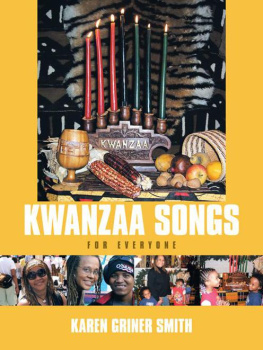
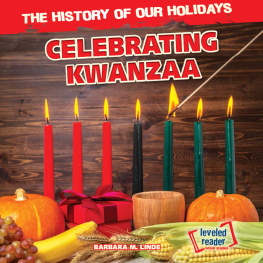
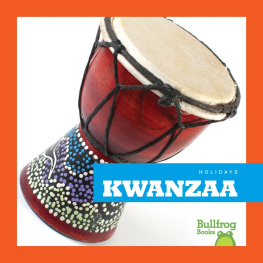

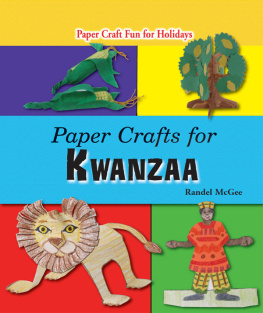
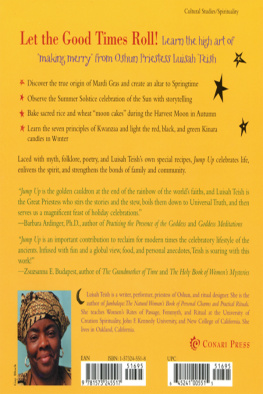
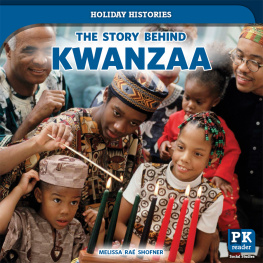
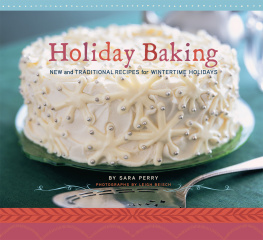
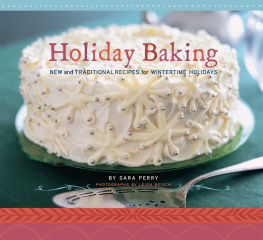
 Karen Griner Smith
Karen Griner Smith  AuthorHouse 1663 Liberty Drive Bloomington, IN 47403 www.authorhouse.com Phone: 1-800-839-8640 2012 Karen Griner Smith. All rights reserved. No part of this book may be reproduced, stored in a retrieval system, or transmitted by any means without the written permission of the author. First published by AuthorHouse 01/06/2012 ISBN: 978-1-4685-4140-3 (sc) ISBN: 978-1-4685-4139-7 (ebk) Printed in the United States of America Any people depicted in stock imagery provided by Thinkstock are models, and such images are being used for illustrative purposes only. Certain stock imagery Thinkstock. This book is printed on acid-free paper.
AuthorHouse 1663 Liberty Drive Bloomington, IN 47403 www.authorhouse.com Phone: 1-800-839-8640 2012 Karen Griner Smith. All rights reserved. No part of this book may be reproduced, stored in a retrieval system, or transmitted by any means without the written permission of the author. First published by AuthorHouse 01/06/2012 ISBN: 978-1-4685-4140-3 (sc) ISBN: 978-1-4685-4139-7 (ebk) Printed in the United States of America Any people depicted in stock imagery provided by Thinkstock are models, and such images are being used for illustrative purposes only. Certain stock imagery Thinkstock. This book is printed on acid-free paper.